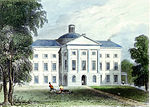Agriculture Building
Buildings and structures in Raleigh, North CarolinaGovernment buildings completed in 1923Government buildings on the National Register of Historic Places in North CarolinaHistoric district contributing properties in North CarolinaNRHP infobox with nocat ... and 5 more
National Register of Historic Places in Raleigh, North CarolinaNeoclassical architecture in North CarolinaRaleigh, North Carolina Registered Historic Place stubsRaleigh, North Carolina building and structure stubsUse mdy dates from August 2023

The Agriculture Building is a historic state government office building located at Raleigh, Wake County, North Carolina. It was built between 1921 and 1923, and is a five-story, Classical Revival. It is sheathed in warm yellow stone, with massive, ashlar veneer, on the ground floor. An addition was built in the 1950s, giving the building an "L"-shape.It was listed on the National Register of Historic Places in 1976. The Agriculture Building is a Raleigh Historic Landmark and located in the Capitol Area Historic District.
Excerpt from the Wikipedia article Agriculture Building (License: CC BY-SA 3.0, Authors, Images).Agriculture Building
West Edenton Street, Raleigh Warehouse District
Geographical coordinates (GPS) Address Nearby Places Show on map
Geographical coordinates (GPS)
| Latitude | Longitude |
|---|---|
| N 35.781388888889 ° | E -78.639444444444 ° |
Address
North Carolina State Capitol
West Edenton Street 1
27601 Raleigh, Warehouse District
North Carolina, United States
Open on Google Maps









